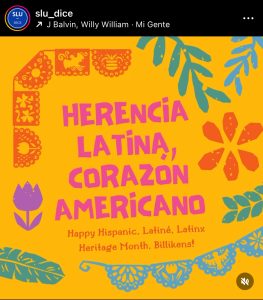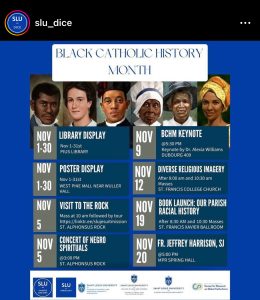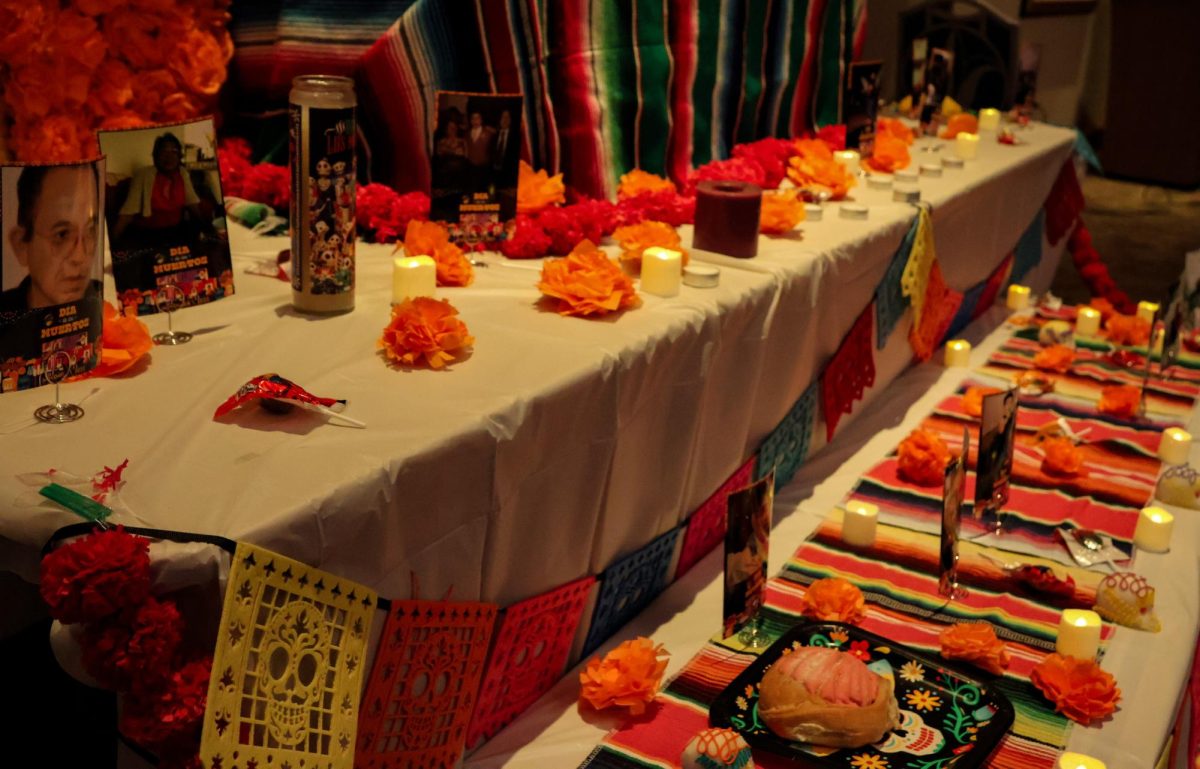After Hispanic Heritage Month, which ran from Sept. 15 to Oct. 15, many students have criticized Saint Louis University’s lack of recognition and effort.
There were only two events celebrating the month, none of which the University or DICE directly organized. Latino students and faculty say the lack of school-sponsored celebratory events is disappointing.
Latinos make up 10% of the undergraduate student body. They stand as the second largest minority group at SLU according to the 2023 SLU profile, which is around 1,300 students.
According to Katherine Knuckles from the Office of Institutional Research, if you remove the students from the Madrid campus from the percentage, it drops down to 8.7% for undergraduates.
On Sept. 15, OASIS hosted the Hispanic and Latinx Heritage Month Kick-Off event, with funding provided by the Cross Cultural Center, in the Center for Global Citizenship (CGC). The event had a variety of foods, a presentation discussing Hispanic and Latinx cultures and games. The event drew 54 attendees.
The School of Medicine was the only other group to recognize Hispanic Heritage Month. On Sept. 15, they hosted a brief event at the Learning Resource Center Auditorium with a few panelists and food sampling.
Puerto Rican student Markos Wester-Rivera, a senior majoring in Political Science, vocalized his disappointment in the lack of acknowledgment by emailing the Division of Diversity and Innovative Community Engagement (DICE).
The email included four other students who felt similarly.
In the email, Wester-Rivera wrote that “as a Latino student”, he “hoped with a new VP of DICE there would be more of an effort to acknowledge the presence and achievement of the Latino community.”
He also said that he found it difficult to be a Latino on campus due to the lack of acknowledgment and efforts by staff.
“I will note that the folks over at the CCC have done an amazing job on their part, however, that has been more of a background role supporting groups like Oasis or hosting events like ATLAS week,” Wester-River wrote in the email.
To conclude his message, he pointed out how there wasn’t an email or event on SLU’s part regarding Hispanic Heritage Month as a whole.
He has since received no response from DICE.
Wester-Rivera said that the lack of recognition made him feel, “ignored, like SLU doesn’t care.”
“It’s frustrating when any sort of community or sense of belonging on campus has to be made by ourselves. Yet, that is DICE’s entire campaign and what they say they do,” Wester-Rivera said.
Wester-Rivera is the Senior Advisor for OASIS and said that as a student group, they can only do so much. He said he would like to see at least an email and a SLU organized event acknowledging Hispanic Heritage Month that isn’t faculty or student-led.
“There was one event MLK scholars put on last year, it was a panel of Latine leaders on campus, but guess who put that on? Me,” Wester-Rivera said. “You want us to thrive, but don’t even acknowledge our existence.”
Senior Pedro Valadez, a Mexican-American, a Political Science major and Spanish minor, said he typically only sees discussions hosted by Spanish professors in the Spanish department.
“I mean, it makes you feel invisible. There’s already not a lot of us on campus,” said Valadez.
Valadez said he wishes SLU reached out to the Latino community more, checked in on them and made sure they are adjusting properly. He also said the Latino community would benefit more from more representation on campus, similar to how they put up signs for Black Jesuits for Black Catholic History Month.
According to Valadez, there was only one instance that he remembered in which signs of famous Latinos were put up, which was in McGannon Hall.
“No one goes in that building. It’s an old decrepit building and it’s literally in a random hallway. No one’s gonna see that,” said Valadez. “Maybe try to put it more out there where people can read it.”
Valadez suggested West Pine as a good place to put up signs since many sororities, fraternities, and other informative messages sponsored by groups go along West Pine to allow for maximum viewing.
“I feel like they try so hard to get you here and then after your first year, they’re like ‘oh, we’re here for you’, and then just disappear,” said Valadez. “I got no help. This is why I feel some people drop out, because you feel like you have your whole support system freshman year and then next thing you know, it’s gone.”
A 2023 graduation and retention report found that SLU’s dropout rate is at 30%, or 802 students who did not complete their degree.
Valadez said that he wants SLU to be a place for his younger siblings, but that he worries that if they came, they would have no support and nowhere to go where they feel accepted.
“I want my siblings to be able to go here and not feel like they have no place to go,” said Valadez.
According to the research provided by Knuckles, in 2023, only 3% of faculty members identified as Latino, or around 81 faculty members. SLU has lost four Latino faculty members since last year, but have held a steady 3% for the past four years.
This number includes, but is not limited to, instructional faculty, adjunct faculty, clinical faculty and both full-time and part-time faculty.
As one of a handful of Latino faculty members at SLU, Dr. Onésimo (Ness) Sándoval, a Mexican-American and sociology professor, believes that Latino events should not only be led by student groups like Oasis.
“It shouldn’t just be Oasis, right, it’s not their responsibility,” Sándoval said. “They should be invited to the table to have a say in setting the agenda, but the university should be intentional saying this is an important month for our students, many of our students.”
Sándoval said he did not receive an email about any events happening or an invitation to speak at one. He said that he has done talks at other universities or organizations around the city and country during Hispanic Heritage Month.
Some of the talks he did were at local organizations and community groups, the University of Missouri and was scheduled for a talk at Columbia University which got postponed.
“It’s an educational moment for those who are coming from non-hispanic backgrounds to understand the contributions that this diverse body is making to the United States, the military and academic institutions throughout the country,” said Sándoval. “To be silent today is really bad in itself and is sending a message to the student body.”
Efforts toward the Latino community should be under DICE, Sándoval said.
“We’re definitely behind in where we need to be as a leading academic institution,” said Sándoval. “If the university feels that this is not important programming [Hispanic Heritage Month], they should stand by that.”
Another student, Julian Garcia, a Mexican-American freshman majoring in psychology, said that before talking about Hispanic Heritage Month, people must acknowledge the historical context behind the term Hispanic.
“You first have to recognize the word Hispanic itself, it doesn’t exist. Hispanic is a term coined by the Reagan administration to lump us in with the colonizing group and throws Spanish people in there and ignores Brazilians,” Garcia said.
Garcia said he wishes that the university and DICE would engage with students more.
“I think that one of the biggest things too is actually having people asking students and engaging with students about what they want to see happen,” said Garcia. “You’re not engaging every single group and saying, ‘this is what we value as an institution’. We’re not bringing people together. They [the university/DICE] don’t do anything.”
Garcia and Wester-Rivera said they would like to see more group collaboration with other cultural groups.
“Many times we act like that if there is a focus on another group, then we are forgotten about, but we should all remember that we are fighting the same battles and only together can we truly overcome our individual issues,” Wester-Rivera said.
Garcia said he wants to see action in the sense of a statement and a speaker panel bringing in immigration attorneys and other people that talk about immigrant rights. He would also like to see a panel filled with Latino students and faculty to talk about their experiences with discrimination.
“We’re not actually seeing the university pushing social justice goals as it claims it has, especially during Hispanic Heritage Month,” Garcia said. “Immigration is the largest issue that is affecting the Latino community, and if you are not pushing for that, you are not living up to the standards of this institution.”
Luella Loseille, the assistant director in the CCC for global citizenship which is an extension of DICE, provided funding for the Hispanic Heritage Month kick-off event. She also works closely with cultural groups on campus including OASIS.
As far as Hispanic Heritage Month goes, Loseille said they typically lean on collaboration with student organizations, but have not in recent years put on anything themselves.
“Typically, I like to always just know, ‘hey, if there’s something that you don’t want to do, kind of just let me know and then we can help provide the funding for that, which we’ve had for the past couple of years,” Loseille said.
Loseille said she sees herself as the person she needed to navigate through school during her time.
After students’ complaints were brought to Loseille’s attention, she put together a listening session for students who identify as Latinx/Hispanic for next Tuesday, Dec. 5, at 5 p.m. in the CGC Auditorium. This is an opportunity for students to share their feedback and experiences at SLU with the CCC staff, she said. More information can be found on their Instagram page @slu_ccc.
Vice president of DICE, Rochelle Smith, who has been at SLU for a year said her main focus is to create spaces of belonging, inclusion and diversity for those who have been historically underrepresented.
Some of what her work details is the belonging initiative that she worked on with her assistant vice president, Allison Brewer. According to the SLU website, the belonging initiative is a voluntary program that will connect students to faculty and staff with similar interests to share a meal and fellowship a few times per semester.
“We look at every school, every key unit, every aspect of the institution and ask ourselves, does this create a sense of belonging for those who, historically, maybe culturally, have not seen themselves or individuals in their families here,” said Smith.
For Hispanic Heritage Month this year, Smith brought up that there were events that happened on South campus, but has a priority on celebrating year-long.
“I look forward to meeting with them [OASIS] to see how they want to celebrate all year and embed culturally into the institution all year. Not just within the month,” Smith said. “We did something in 2022 from DICE and then South campus did something this year, but DICE didn’t do anything standalone this year.”
Smith said that her plan to meet with OASIS is relatively in a year or so. As far as responding to student emails such as Wester-Rivera’s, she said that her team did not see it but would like to meet with these students regardless
“We can do things every day all day, but if students don’t feel a sense of belonging, a sense of inclusion, a sense of support, then we haven’t done anything,” said Smith.
Conversely, Valadez and Wester-Rivera criticized DICE for hosting no standalone events or sending out any messages other than one Instagram post. They also criticized how for Black Catholic History month, a seemingly niche subject, had nine celebratory events and signs along West Pine.


“For a school that says they want to build community and belonging among students, why is it that there is not a single event lifting up our Latine students, but nine events about Black Catholics,” Wester-Rivera said. “On top of that, despite being in a predominantly Black city, why is our Black student population one of the smallest on campus?”
Wester-Rivera went on to say that this is a slap in the face for both Latine and Black students who identify as Latine.
According to the U.S. Census Bureau, National Hispanic Heritage Month celebrates the history, culture and contributions of “American citizens whose ancestors came from Spain, Mexico, the Caribbean and Central and South America,”.
This yearly recognition began in 1968 under President Lyndon Johnson and was expanded by President Ronald Reagan in 1988. This expansion spread the recognition period to 30 days.
Comparatively, universities such as Washington University, Boston College, Notre Dame and Loyola have done a series of events for the month, or ones that are more immersive, than SLU has.
















